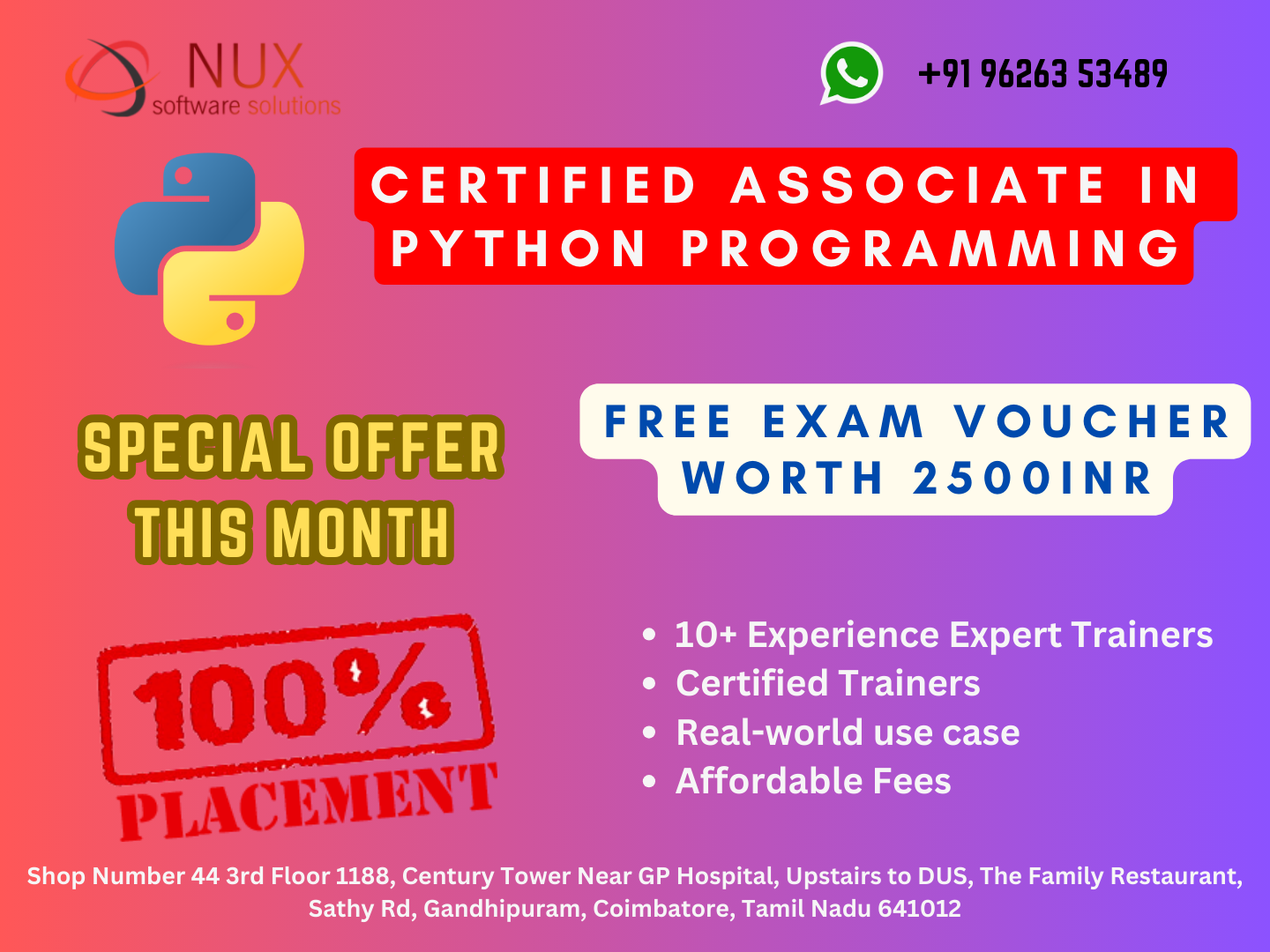Certified Associate in Python Programming


Best Certified Associate in Python Programming training courses classes deliver by Nux Software Training & Certification Solutions in coimbatore.
Nux Software Training & Certification Solutions in Coimbatore stands out with its excellent and advanced training programs designed to enhance your performance and provide hands-on experience. Our industry-expert trainers bring a diverse range of skills and extensive experience to the table. The training center offers an outstanding environment suitable for professionals, individuals, corporate clients, live project training, and industrial training. The state-of-the-art lab infrastructure is advanced, well-managed, and accessible 24/7 from anywhere. With international expert trainers who possess real-time industry experience, our training programs incorporate innovative learning methods and delivery models. We prioritize understanding your requirements, ensuring 100% career growth through cost-effective and flexible training programs tailored to the needs of our trainees.
Get the best Training on Python from Nux Software Training & Certification Solutions.
Absolutely! Becoming an Associate in Python is a fantastic choice, and Nux Software Training & Certification Solutions is the perfect place to gain expertise in Python. Our comprehensive training module covers all aspects of Python, providing you with the skills and knowledge needed to excel in this programming language. Whether you’re a beginner or looking to enhance your existing skills, our training program is designed to meet your needs and help you succeed in your Python journey.
It’s great to hear that Nux Software Training & Certification Solutions is equipped with some of the best faculties and top-notch infrastructure to deliver high-quality Python training. With different sections covering various aspects of the programming language, students are sure to receive a comprehensive and well-rounded education. Having a structured course that addresses different facets of Python ensures that students gain a holistic understanding of the language. This approach undoubtedly contributes to a more enriching learning experience.
Course Syllabus
Section - 1 - Modules and Packages (12%)
PCAP-31-03 1.1 – Import and use modules and packages
- import variants: import, from import, import as, import *
- advanced qualifying for nested modules
- the dir() function
- the sys.path variable
PCAP-31-03 1.2 – Perform evaluations using the math module
- functions: ceil(), floor(), trunc(), factorial(), hypot(), sqrt()
PCAP-31-03 1.3 – Generate random values using the random module
- functions: random(), seed(), choice(), sample()
PCAP-31-03 1.4 – Discover host platform properties using the platform module
- functions: platform(), machine(), processor(), system(), version(), python_implementation(), python_version_tuple()
PCAP-31-03 1.5 – Create and use user-defined modules and packages
- idea and rationale;
- the __pycache__ directory
- the __name__ variable
- public and private variables
- the __init__.py file
- searching for/through modules/packages
- nested packages vs. directory trees
Section - 2 - Exceptions (14%)
PCAP-31-03 2.1 – Handle errors using Python-defined exceptions
- except, except:-except, except:-else:, except (e1, e2)
- the hierarchy of exceptions
- raise, raise ex
- assert
- event classes
- except E as e
- the arg property
PCAP-31-02 2.2 – Extend the Python exceptions hierarchy with self-defined exceptions
- self-defined exceptions
- defining and using self-defined exceptions
Section - 3 - Strings (18%)
PCAP-31-03 3.1 – Understand machine representation of characters
- encoding standards: ASCII, UNICODE, UTF-8, code points, escape sequences
PCAP-31-03 3.2 – Operate on strings
- functions: ord(), chr()
- indexing, slicing, immutability
- iterating through strings, concatenating, multiplying, comparing (against strings and numbers)
- operators: in, not in
PCAP-31-03 3.3 – Employ built-in string methods
- methods: .isxxx(), .join(), .split(), .sort(), sorted(), .index(), .find(), .rfind()
Section - 4 - Object-Oriented Programming (34%)
PCAP-31-03 4.1 – Understand the Object-Oriented approach
- ideas and notions: class, object, property, method, encapsulation, inheritance, superclass, subclass, identifying class components
PCEP-31-03 4.2 – Employ class and object properties
- instance vs. class variables: declarations and initializations
- the __dict__ property (objects vs. classes)
- private components (instances vs. classes)
- name mangling
PCAP-31-03 4.3 – Equip a class with methods
- declaring and using methods
- the self parameter
PCAP-31-03 4.4 – Discover the class structure
- introspection and the hasattr() function (objects vs classes)
- properties: __name__, __module__ , __bases__
PCAP-31-03 4.5 – Build a class hierarchy using inheritance
- single and multiple inheritance
- the isinstance() function
- overriding
- operators: not is, is
- polymorphism
- overriding the __str__() method
- diamonds
PCAP-31-03 4.6 – Construct and initialize objects
- declaring and invoking constructors
Section - 5 - Miscellaneous (22%)
PCAP-31-03 5.1 – Build complex lists using list comprehension
- list comprehensions: the if operator, nested comprehensions
PCAP-31-03 5.2 – Embed lambda functions into the code
- lambdas: defining and using lambdas
- self-defined functions taking lambdas as arguments
- functions: map(), filter()
PCAP-31-03 5.3 – Define and use closures
- closures: meaning and rationale
- defining and using closures
PCAP-31-03 5.4 – Understand basic Input/Output terminology
- I/O modes
- predefined streams
- handles vs. streams
- text vs. binary modes
PCAP-31-03 5.5 – Perform Input/Output operations
- the open() function
- the errno variable and its values
- functions: close(), .read(), .write(), .readline(), readlines()
- using bytearray as input/output buffer


